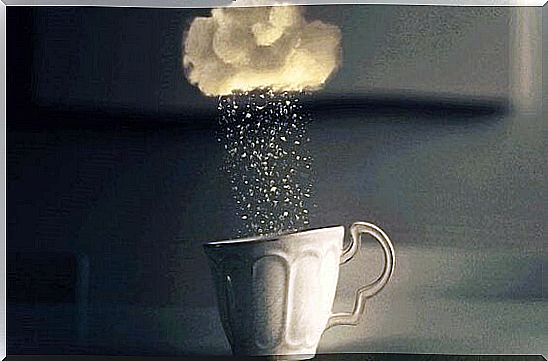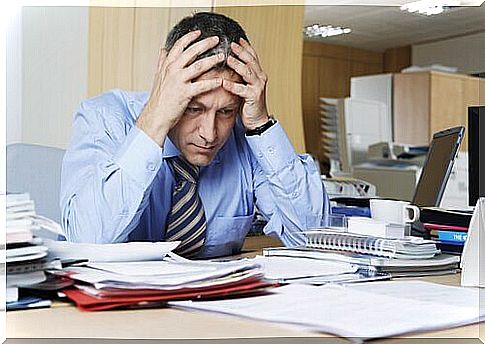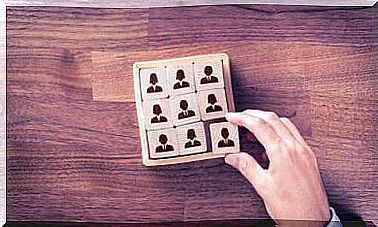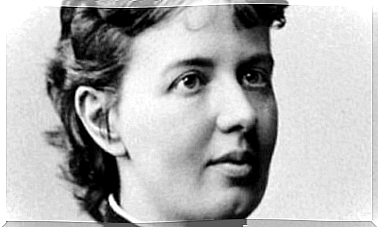What Psychological Exhaustion Looks Like

Psychological exhaustion weakens us both physically and mentally. It is something that arises as a result of having too much to do or think about. Too many decisions, too many intrusive thoughts, too much work, too many commitments, distractions, worries… the list goes on.
On the other hand, it is also not having enough of many things in life. Not enough quality time for yourself, not enough sleep, not enough inner peace and tranquility. Read on and find out the many signs of psychological exhaustion and how to act before it is too late.
We all know what it feels like to be burned out on all levels. It is important to remember that a tired brain, one that is psychologically exhausted, functions and responds to stimuli completely differently. Brain scientist Matthew Walker was able to demonstrate in the laboratory that mentally tired people have a more negative perception of their reality. In addition, they are much more emotionally sensitive.
One misconception we often have is that psychological exhaustion is mainly due to a fatal accumulation of mistakes, bad decisions, failures or disappointments. This is simply not true. Most of the time, exhaustion is based on something completely different. It is the direct result of having too much to do without realizing that it is simply too much for us.
We have all heard that our perspective depends on how we see the glass, either half full or half empty. Sometimes it only takes one drop for it to overflow and we reach our limit. Psychological exhaustion takes over completely.

Psychological exhaustion: An all too common problem
Charlie feels happy with his life; in fact, he could not have wished for anything more. He is a graphic designer, he enjoys his work, he has a wife he loves and he has just become a father. He is happy with everything around him and has no major problems in life.
But he begins to notice that it is becoming harder and harder for him to make decisions. He has become more irritable, he is unable to concentrate, and he even has trouble falling asleep at night.
He does not understand what is happening to him. Everything seems fine; in fact, he should feel happier than ever. But in his mind there is a kind of censor who tells him, “something is not quite right”.
If we had someone watching Charlie’s life from the outside, that person could point out several things that could possibly have stopped him from being burned out.
One thing they would point out (and deep down, Charlie already knows) is that he has too many things going on in his life. A campaign, new work projects and clients he must keep happy, a child and a mortgage. He is also at a point in life where he wants everything to be ” perfect “.
All this means at the same time that Charlie has less time for each of these responsibilities, and it simply becomes too much for him. It threatens his ability to handle things. The mental exhaustion is evident, and he is burned out. Here are some signs of physical exhaustion and how it affects us.

Signs of mental exhaustion
- Physical fatigue and lack of energy. The exhaustion sometimes gets so bad that we get up in the morning sure that we will not be able to get through the day.
- Insomnia. In the beginning, it is common to suddenly wake up at night, but later this can cause severe difficulty falling asleep.
- Memory loss. According to an article published in the Journal of Forensic Psychiatry and Psychology , psychological exhaustion often produces a cognitive impairment called the “disinformation effect.” This is where we confuse information, and where we remember mistakes, mix images, people and situations.
- Regarding physical symptoms: palpitations, digestive problems, headaches, lack of hunger or an excessive increase in appetite are all common.
- On an emotional level , we can become more sensitive and at the same time apathetic, irritable and pessimistic.
- Another common trait is anhedonia, that is, an inability to feel joy, and to enjoy things as much as we did before. We no longer look forward to things, and life turns gray, at the same time as the world feels far away.
How to deal with psychological exhaustion
Eric Hoffer said that the worst fatigue comes from work that you have not done. It is so true. Sometimes real exhaustion comes because of everything we want to do but do not do. This is because of all the daily goals we have set ourselves, but it becomes too much, or we do not have time to do everything. And because of them, we have to give up because we are under too much pressure.
So, in the end, it happens. The last drop comes and it breaks the water surface. That’s when everything goes wrong. So the first thing we need to do is realize what is happening to us.
Psychological exhaustion looms over us, and we must prevent the “creature” from getting bigger, darker and heavier. Let’s take a look at the following 3 steps we should use.

3 “permissions” you must give yourself to get rid of the clouds of mental exhaustion
- Give yourself permission to rediscover yourself. It may seem ironic, but psychological exhaustion tends to trap us in layers upon layers of worries, pressures, duties, and anxieties. Until we reach the point that we actually forget ourselves. Give yourself permission to find yourself again, and to do this there is nothing better than enjoying an hour a day completely disconnected from all kinds of stimulation. Away from people, sounds, artificial lights, technology, etc. Find a quiet environment to just exist.
- Give yourself permission to prioritize. This is absolutely crucial. Remember what your priorities are, where your identity is, what you love, what makes you happy. The rest will be secondary and should not be rewarded by emotional and personal investment on your part.
- Give yourself permission to be less demanding. It is 24 hours a day, and life, whether we like it or not, has its limits. Learn to be realistic with your time. Do not put too much pressure on yourself or set too high standards for yourself. You do not need everything to always be perfect. Sometimes it’s enough that everything is as it was yesterday. Sometimes a modest, quiet balance is enough.
Finally, we know that life is becoming more demanding and that we want to do everything. But it is worth remembering this: We consist of flesh and blood, a heart and mental “muscles” that need to be fed with quality time, rest, peace and leisure. Let us learn to put ourselves first and take care of ourselves as we deserve…









